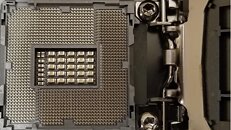- Joined
- Oct 9, 2007
- Messages
- 47,653 (7.44/day)
- Location
- Dublin, Ireland
| System Name | RBMK-1000 |
|---|---|
| Processor | AMD Ryzen 7 5700G |
| Motherboard | Gigabyte B550 AORUS Elite V2 |
| Cooling | DeepCool Gammax L240 V2 |
| Memory | 2x 16GB DDR4-3200 |
| Video Card(s) | Galax RTX 4070 Ti EX |
| Storage | Samsung 990 1TB |
| Display(s) | BenQ 1440p 60 Hz 27-inch |
| Case | Corsair Carbide 100R |
| Audio Device(s) | ASUS SupremeFX S1220A |
| Power Supply | Cooler Master MWE Gold 650W |
| Mouse | ASUS ROG Strix Impact |
| Keyboard | Gamdias Hermes E2 |
| Software | Windows 11 Pro |
Intel's upcoming 400-series desktop chipset will lack support for PCI-Express gen 4.0. The motherboards will stick to gen 3.0 for both the main x16 PEG slots wired to the LGA1200 socket, and general purpose PCIe lanes from the PCH, according to a Tom's Hardware report. It was earlier expected that 400-series chipset motherboards will come with preparation for PCIe gen 4.0, so even if the upcoming 10th gen "Comet Lake" desktop processors lacked gen 4.0 root-complexes, the boards would be fully ready for the new bus standard in 11th gen "Rocket Lake" desktop processors.
10th gen "Comet Lake" desktop processors are built on 14 nm process, and implement Intel's current-gen CPU core design Intel has been implementing since 6th gen "Skylake." It's only with 11th gen "Rocket Lake" that the mainstream desktop platform could see a new CPU core design, with the company reportedly back-porting "Willow Cove" CPU cores to the 14 nm process. "Rocket Lake" is also expected to feature a small Gen12 iGPU with 32 execution units, and a new-gen uncore component that implements PCIe gen 4.0. PCIe gen 4.0 doubles bandwidth over gen 3.0, and while only a handful GPUs support it, the standard is made popular by a new generation of M.2 NVMe SSDs that are able to utilize the added bandwidth to push sequential transfer rates beyond M.2 PCIe 3.0 x4 limitations.

It is also being reported that Intel has delayed the launch of 10th gen Core desktop processors and 400-series chipset motherboards to Q2-2020, to as early as April. Motherboards based on Intel 400-series chipset were the most notable absentees at the 2020 International CES, and it's rumored that a last-minute decision to delay the platform's launch caused exhibitors to box up their Z490 chipset motherboards. With an April launch, "Comet Lake" will lead Intel's mainstream desktop product line for at least three quarters. Intel is expected to debut 11th gen "Rocket Lake" in the 2021 CES, unless something changes then.
View at TechPowerUp Main Site
10th gen "Comet Lake" desktop processors are built on 14 nm process, and implement Intel's current-gen CPU core design Intel has been implementing since 6th gen "Skylake." It's only with 11th gen "Rocket Lake" that the mainstream desktop platform could see a new CPU core design, with the company reportedly back-porting "Willow Cove" CPU cores to the 14 nm process. "Rocket Lake" is also expected to feature a small Gen12 iGPU with 32 execution units, and a new-gen uncore component that implements PCIe gen 4.0. PCIe gen 4.0 doubles bandwidth over gen 3.0, and while only a handful GPUs support it, the standard is made popular by a new generation of M.2 NVMe SSDs that are able to utilize the added bandwidth to push sequential transfer rates beyond M.2 PCIe 3.0 x4 limitations.

It is also being reported that Intel has delayed the launch of 10th gen Core desktop processors and 400-series chipset motherboards to Q2-2020, to as early as April. Motherboards based on Intel 400-series chipset were the most notable absentees at the 2020 International CES, and it's rumored that a last-minute decision to delay the platform's launch caused exhibitors to box up their Z490 chipset motherboards. With an April launch, "Comet Lake" will lead Intel's mainstream desktop product line for at least three quarters. Intel is expected to debut 11th gen "Rocket Lake" in the 2021 CES, unless something changes then.
View at TechPowerUp Main Site








